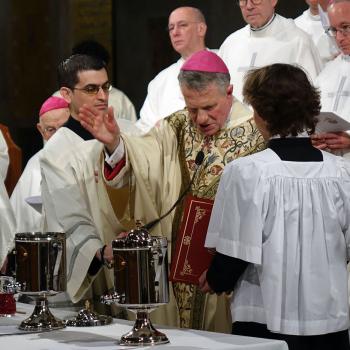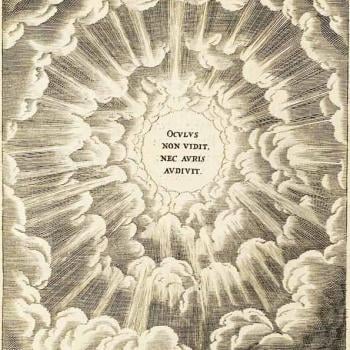
We are not to worship creation, but the Creator. This does not mean we are to ignore the good of creation, nor, especially, to disrespect it. We are not worshiping creation if we look to the world we see, realize its importance for our temporal existence, and do what we can to make sure it remains in good shape. Protecting the environment, taking care of the earth and all its inhabitants, is what we should all be doing. If we disrespect it, if we show it contempt and think we can destroy it, acting like in doing so, we are destroying some idol, we show disrespect to the one who brought it into being, God. If we took a long time creating a work of art, maybe some painting which we have longed to produce, and when it is done, we consider it a masterpiece, we would be more than a little upset if someone came around, took a hatchet to it, and destroyed it. Why, then, are Christians surprised if they are told God is not pleased when they defile the world around them? We have been warned that God’s wrath will be upon those who destroy the earth. Indeed, we have been given the task to be stewards of the earth, working to protect it, for in doing so, we not only protect our own interests (if the environment is destroyed, we will not be able to live) but God’s interests as well. And, as it is a work of God, as it is something which can be compared to a work of art, a work of beauty, which God created, we can look at and contemplate creation, using it as a means to apprehend something of the truth of God:
Those who believe in a personal God, Creator, do not think the Universe is in itself worshipful, though devoted study of it may be one of the ways of honouring Him. And while as living creatures we are (in part) within it and part of it, our ideas of God and ways of expressing them will be largely derived from contemplating the world about us. (Though there is also revelation both addressed to all men and to particular persons.) [1]
This is why creation itself can be said to be a sacrament of God:
The whole universe is, for those who possess purified eyes, a living sacrament, in the broadest sense of the word. In the meeting of the contemplative and God, the material creation not only symbolizes God’s presence but also plays a role in the transfiguring power of God and the contemplative to bring all things into Christ.[2]
Evil seeks to destroy or annihilate creation, but it does not have the power to complete its desire. God preserves and protects creation, even as God will restore to it what evil had taken away from it in the eschaton, so that the harm it suffered will be healed by God and God’s grace. Annihilationism is the way of evil, preservation and healing is the way of God. When we look at the way our actions, our sins, have defiled the world around us, wounding it, no matter how much harm we have caused, there remains something there, something good behind all the sin, something beautiful for us to see and experience, a beauty which can bring us much joy: “The beauty of the created universe is free from all fault because of these three things – the condemnation of sinners, the proving of the just, and the perfection of the blessed.”[3] The beauty or goodness of creation remains despite sin, and God works to reveal that beauty by taking away the sin of the world – sinners are condemned insofar as sin is condemned, but as Jesus takes on the sin of the world upon himself, he works to liberate sinners from sin so that they will no longer be sinners, but rather, become one of the just. That is, sinners are condemned by the condemnation of sin, but when the sin is cast off, they are no longer sinners, and so they can become just and perfected with grace. This is possible because, despite all the sin, there was always some goodness in them, something for God to use and perfect with grace.
Therefore, we can look at creation, recognizing in it the goodness and beauty given to it by God, a goodness which remains no matter how much it has been defiled by us and our sin. Just as if a statue was covered in mud might only lead us to see the mud, and perhaps the shape of the stature, with its true worth hidden from sight, that worth would be revealed once it is washed and it would have always been there despite not being seen, so the world around us, even if we cannot perceive its worth, keeps its inherent value, and will reveal it when we wash it clean from our filth. Once we have done so, the world will actually reveal to us many things about God:
The nature of the Essence is invisible but can be known by means of His mysteries. That is to say, those mysteries which <God> wills that they be made known. And they are known by means of meditating on the structure of the universe. <This occurs> especially by continual consideration of God’s Economy in its various revelations, given indeed to inform the diligent mind which inquires faithfully and searches these things assiduously.[4]
Looking to creation, honoring and respecting it, seeking to preserve its goodness from all defilement, does not, therefore, indicate some sort of idolatry; rather, doing all of this is how we honor and respect the one who created it. We should understand the Creator, God, has given us various ways to apprehend various truths about the divine nature by creation; realizing this, using creation as a means to apprehend those truths does not turn creation into an idol, but rather the reverse, for only when we ignore the sacramental, and therefore symbolic, side of creation do we risk becoming idolatrous. We must, therefore, do our part, to take care of creation and respect it, allowing it to be what it was meant to be by God when God created it, instead of ignoring it and its good, allowing it to be destroyed by our indifference.
[1] J.R.R. Tolkien, The Letters of J.R.R. Tolkien. Revised and Expanded Edition. Ed. Humphrey Carpenter and Christopher Tolkien (Broadway, NY: William Morrow, 2023), 562 [Letter 310 to Camilla Unwin].
[2] George Maloney, SJ, Prayer of the Heart (Notre Dame, IN: Ave Maria Press, 1981), 181.
[3] St. Augustine, “Of True Religion,” in Augustine: Earlier Writings. trans. John H.S. Burleigh (Philadelphia: The Westminster Press, 1953), 247.
[4] St. Isaac the Syrian, “The Third Part.” Trans. Mary T. Hansbury in An Anthology of Syriac Writers From Qatar in the Seventh Century. Ed. Mario Kozah, Abdulrahim Abu-Husayn, Saif Shaeen Al-Murikhi and Haya Al Thani (Piscataway, NJ: Gorgias Press, 2015), 294 [I.17].
Stay in touch! Like A Little Bit of Nothing on Facebook.
If you liked what you read, please consider sharing it with your friends and family!
N.B.: While I read comments to moderate them, I rarely respond to them. If I don’t respond to your comment directly, don’t assume I am unthankful for it. I appreciate it. But I want readers to feel free to ask questions, and hopefully, dialogue with each other. I have shared what I wanted to say, though some responses will get a brief reply by me, or, if I find it interesting and something I can engage fully, as the foundation for another post. I have had many posts inspired or improved upon thanks to my readers.
















